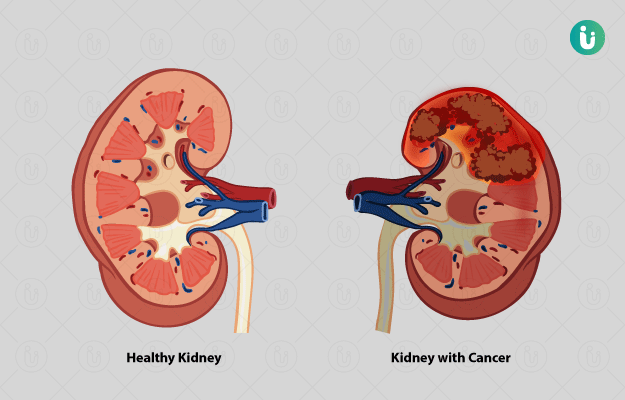What is Kidney Cancer?
Cancers of the kidney may be of various types. Nearly 90-95% of kidney cancers are of the renal cell carcinoma variant. The disease mostly affects elderly people; however, young people may also be affected due to hereditary factors. Kidney cancer in children is extremely rare. The condition lacks specific signs and symptoms in the early stages, making it difficult to diagnose and treat.
What are its main signs and symptoms?
The disease remains inconspicuous unless it reaches an advanced stage. Most patients are thus asymptomatic. The presence of the triad of these symptoms is a warning sign:
- Passing blood in urine
- Pain in the lower back on either/both sides or radiating to the abdomen (Read more: Back pain causes)
- Presence of a palpable mass in abdomen
Other symptoms include weight loss, which is sudden and unintended; loss of appetite; lethargy; and fever. Often, there are no symptoms, and the disease is diagnosed during an imaging test done for some other purpose.
If you are tired of dieting and exercising and are not able to lose weight, then use myUpchar Ayurveda Medarodh Fat Burner Capsule, it has no side effects, order it today and avail the benefits.
What are its main causes?
Kidney cancer cannot be attributed to a single cause. Several factors increase the likelihood of developing renal cancer. These include
- Smoking, which doubles the risk
- Obesity with a body mass index (BMI) over 30
- Hypertension
- Exposure to aromatic chemicals such as benzene
- Long-term dialysis
- Receiving kidney transplantation
How is it diagnosed and treated?
Kidney cancer presents with very few symptoms, but renal cell carcinoma is known for being associated with a number of paraneoplastic syndromes, including high calcium levels and increased red blood cell count. Mostly, tests begin with a clinical history and examination. Upon a suspicion of any possible kidney disease, a battery of blood and urine tests will be done. If cancer is suspected or a mass is detected in the abdomen, imaging studies, such as MRI and CT scans, might be required. Also, an ultrasound, PET scan, and X-ray of the chest and bone might be done to understand the extent of metastasis.
Treatment varies based on the stage of kidney cancer. Treatment mostly consists of surgery wherein a part or the entire kidney may be removed depending upon the size of the tumour. It may be combined with chemotherapy.

 Doctors for Kidney Cancer
Doctors for Kidney Cancer  OTC Medicines for Kidney Cancer
OTC Medicines for Kidney Cancer



















